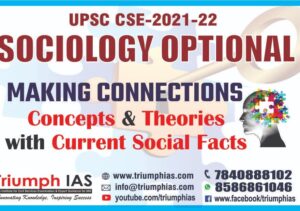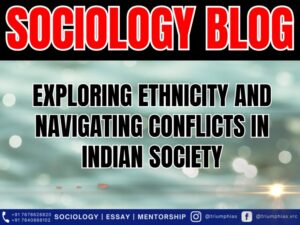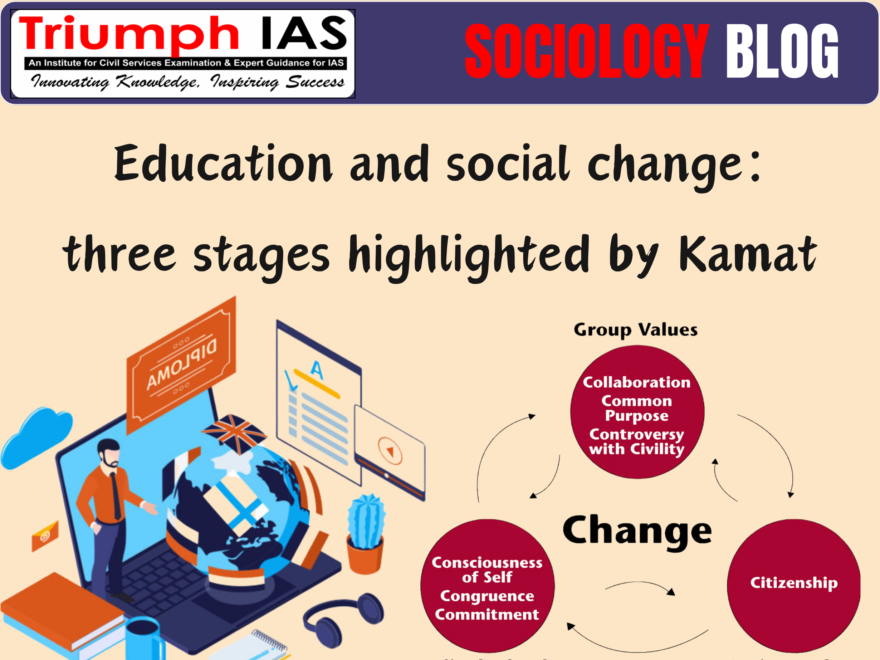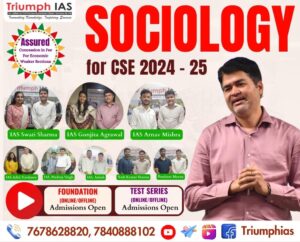Education and social change: three stages highlighted by Kamat
Relevant for Sociology Optional for Civil Service Examination.
Sociology Paper -2
Unit 3 : Social Change in India : Vision of Social change in India
Education and social change: three stages highlighted by Kamat
Kamat conceptualized the relationship between education and social change in India in three stages.
- First stage :
- In the first stage, he talks about the early British period to the end of the 19th century. In this period, the colonial socioeconomic and political structure was established in India.
- However it also played a kind of liberating role in breaking down traditional norms and values, which were in consonance with the older feudal, socio-economic politic and were a hindrance to itself.
- It also sowed the seeds of new norms and values -of a bourgeoisie society and modern nationalism. This liberating influence was internalized and worked in two directions:
- i) Towards a close scrutiny of the indigenous social systems and culture leading to powerful movements of social and religious reform and protests movements ,ike Satya Shodak Samaj
- ii) Towards the process of self-discovery, self-assessment in the context of the new situation, leading to the creation of an alternative centre of social cohesion, the anti-imperialist movement for national liberation.
- 2nd stage :
- In the period between the two world wars, education assumed a mass character. Occupational and social mobility occurred among segments of population that were hitherto unnoticed.
- So far education had spread mainly to the upper caste and urban upper strata in society. Now it began to percolate to sections lower in the social hierarchy, the middle castes and middle strata. This carried the process of nationalism and social awakening still further, to the working class in the towns and to the peasantry in the countryside.
- The process considerably strengthened the movement for national liberation as well as the movement for social change. Meanwhile, the growth of the colonial system of education was developing serious contradictions within itself and also vis-a- vis the colonial socio-economic structure. This provided added edge to the principal contradiction between the British imperialism and the Indian people. This contradiction was reflected in large-scale unemployment among the educated on the one hand and the liberating influence in the strength and militancy of the powerful student and youth movement or the other.
- Third Stage:
- In the third stage, i.e. from post-Independence period up to the mid-sixties, the process of social and political awakening has taken further strides. Its two aspects, conformity and liberation, are also operating. At the same time, the contradiction within the education system i.e., in relation the development, socio-economic structure have also sharpened.
Ananda Coomaraswamy ‘s views on education
Ananda Coomaraswamy, a renowned Indian scholar and philosopher, held a unique view on the role of education in Indian culture. According to Coomaraswamy, education should not be confined to a mere system but should focus on drawing out and setting free the characteristic qualities of the taught. He believed that culture in the East has been only secondarily connected with books and learning, and it has been a part of life itself.Some key aspects of Coomaraswamy’s view on the role of education in Indian culture include:
- Emphasis on the teacher’s personality: Coomaraswamy stressed the importance of the teacher’s personality and the development of personal character and conduct.
- Integration of ethics and altruism: He believed that ethics should spring from altruism and not from religious or other commandments.
- Preservation of Indian culture: Coomaraswamy lamented the loss of Indian ideals, such as speech, action, concentration, and stillness, which existed for centuries despite Islamic invasions. He attributed this decline to the British influence, which he felt was necessary for preserving Indian culture.
- Nationalization of Indian education: Coomaraswamy believed that it was up to the Indians to nationalize their education system and rise to the occasion, even if the country was Europeanized.
- Training of memory: Coomaraswamy emphasized the importance of training memory, which was a conspicuous feature of Indian education.
Ananda Coomaraswamy’s view on the role of education in Indian culture was centered around drawing out the characteristic qualities of the taught, preserving Indian culture, emphasizing the teacher’s personality, and integrating ethics with altruism.
Reference: Static Portion
Related Blogs…
 |
 |
Frequently Asked Questions:
1. Question: Define the term “ethnic movement” and provide an example from India.
Answer: An ethnic movement refers to a collective effort by a group sharing common cultural, linguistic, or religious traits, seeking to assert their identity and rights; an example from India is the Khalistan Movement in Punjab.
2. Question: Identify the main objectives behind the Gorkhaland ethnic movement.
Answer: The Gorkhaland ethnic movement primarily seeks to establish a separate state for India’s Nepali-speaking population in the Darjeeling region, advocating for linguistic and cultural recognition and political autonomy.
3. Question: What was the Operation Blue Star, and which ethnic movement was it related to?
Answer: Operation Blue Star was a military action in 1984, aiming to remove Sikh militants hiding in the Golden Temple in Amritsar; it is related to the Khalistan movement, which sought a separate Sikh country.
4. Question: Mention a critical factor that triggered the emergence of ethnic movements in India, as discussed by Dipankar Gupta.
Answer: Dipankar Gupta emphasized that ethnicity is fundamentally a political process, wherein caste and religion, the key components of identity formation, are politicized by leaders for vested interests.
5. Question: What were the primary reasons for the Assam Ethnicity conflicts involving Bodo tribals and Bengali Muslim settlers?
Answer: The Assam Ethnicity conflicts primarily stemmed from issues related to immigration, land rights, and resource allocation, leading to clashes, riots, and evolving relationships among indigenous communities to address challenges.
6. Question: Briefly describe the role of the Dravidian Movement in terms of caste and societal structure.
Answer: The Dravidian Movement, led notably by E.V. Ramasamy, aimed to establish an egalitarian society, focusing on anti-Brahmanism and advocating for equal rights for backward castes, while also introducing reforms like self-respect marriages.
7. Question: Name the prominent ethnic movements in North-East India and specify one common objective.
Answer: Prominent ethnic movements in North-East India include the Nagas’ and Mizos’ struggles; a common objective was to gain autonomy and recognition for their distinct tribal identities and cultural uniqueness.
8. Question: What is the key argument of Gail Omveldt regarding traditional Indian society and multiculturalism?
Answer: Gail Omveldt opposed romanticizing traditional Indian society, arguing that hierarchy has always dominated it and dismissing the notion that multiculturalism is an intrinsic feature of Indian society as a myth.
9. Question: Briefly explain the social hierarchy factor as a contributing element to ethnic movements as suggested by Olzak.
Answer: Olzak suggests that the construction of hierarchies among ethnic communities, which often leads to the suppression of one group by another, is a key factor that can instigate social and ethnic movements.
10. Question: Identify one consequence of the unequal economic development factor within the context of ethnic movements in India.
Answer: One consequence of unequal economic development is the marginalization and underdevelopment of certain groups, leading to feelings of alienation and sometimes initiating ethnic movements as these groups strive for equality and recognition.
GS Related Practices Questions…
To master these intricacies and fare well in the Sociology Optional Syllabus, aspiring sociologists might benefit from guidance by the Best Sociology Optional Teacher and participation in the Best Sociology Optional Coaching. These avenues provide comprehensive assistance, ensuring a solid understanding of sociology’s diverse methodologies and techniques.
META TAGS:
Ethnic Movements, ethnic movements in india, ethnic movement in sociology, Punjab Movement, North-East Ethnic Movements, Gorkhaland Movement, Dravidian Movement, Assam Ethnicity, Ethnic Conflicts, Sociopolitical Impact, India, Ethnic Consciousness, Ethnic Rights, Political Crisis, Economic Development, Cultural Disparities, Khalistan Movement, Nagaland, Mizoram, Multiculturalism, Political Economy, Identity Formation, Social Hierarchies, Bodo Tribals, Bengali Muslim Settlers, Anti-Sikh Riots, Operation Blue Star, Unequal Development, Ethnic Violence, Political Mobilization

Why Vikash Ranjan’s Classes for Sociology?
Proper guidance and assistance are required to learn the skill of interlinking current happenings with the conventional topics. VIKASH RANJAN SIR at TRIUMPH IAS guides students according to the Recent Trends of UPSC, making him the Best Sociology Teacher for Sociology Optional UPSC.
At Triumph IAS, the Best Sociology Optional Coaching platform, we not only provide the best study material and applied classes for Sociology for IAS but also conduct regular assignments and class tests to assess candidates’ writing skills and understanding of the subject.
Choose The Best Sociology Optional Teacher for IAS Preparation?
At the beginning of the journey for Civil Services Examination preparation, many students face a pivotal decision – selecting their optional subject. Questions such as “which optional subject is the best?” and “which optional subject is the most scoring?” frequently come to mind. Choosing the right optional subject, like choosing the best sociology optional teacher, is a subjective yet vital step that requires a thoughtful decision based on facts. A misstep in this crucial decision can indeed prove disastrous.
Ever since the exam pattern was revamped in 2013, the UPSC has eliminated the need for a second optional subject. Now, candidates have to choose only one optional subject for the UPSC Mains, which has two papers of 250 marks each. One of the compelling choices for many has been the sociology optional. However, it’s strongly advised to decide on your optional subject for mains well ahead of time to get sufficient time to complete the syllabus. After all, most students score similarly in General Studies Papers; it’s the score in the optional subject & essay that contributes significantly to the final selection.
“A sound strategy does not rely solely on the popular
Opinion of toppers or famous YouTubers cum teachers.”
It requires understanding one’s ability, interest, and the relevance of the subject, not just for the exam but also for life in general. Hence, when selecting the best sociology teacher, one must consider the usefulness of sociology optional coaching in General Studies, Essay, and Personality Test.
The choice of the optional subject should be based on objective criteria, such as the nature, scope, and size of the syllabus, uniformity and stability in the question pattern, relevance of the syllabic content in daily life in society, and the availability of study material and guidance. For example, choosing the best sociology optional coaching can ensure access to top-quality study materials and experienced teachers. Always remember, the approach of the UPSC optional subject differs from your academic studies of subjects. Therefore, before settling for sociology optional, you need to analyze the syllabus, previous years’ pattern, subject requirements (be it ideal, visionary, numerical, conceptual theoretical), and your comfort level with the subject.
This decision marks a critical point in your UPSC – CSE journey, potentially determining your success in a career in IAS/Civil Services. Therefore, it’s crucial to choose wisely, whether it’s the optional subject or the best sociology optional teacher. Always base your decision on accurate facts, and never let your emotional biases guide your choices. After all, the search for the best sociology optional coaching is about finding the perfect fit for your unique academic needs and aspirations.
To master these intricacies and fare well in the Sociology Optional Syllabus, aspiring sociologists might benefit from guidance by the Best Sociology Optional Teacher and participation in the Best Sociology Optional Coaching. These avenues provide comprehensive assistance, ensuring a solid understanding of sociology’s diverse methodologies and techniques. Sociology, Social theory, Best Sociology Optional Teacher, Best Sociology Optional Coaching, Sociology Optional Syllabus.
Best Sociology Optional Teacher, Sociology Syllabus, Sociology Optional, Sociology Optional Coaching, Best Sociology Optional Coaching, Best Sociology Teacher, Sociology Course, Sociology Teacher, Sociology Foundation, Sociology Foundation Course, Sociology Optional UPSC, Sociology for IAS,
Follow us :



Find More Blogs…
| Compare and contrast Karl Marx’s and Max weber’s | Karl Marx- Historical Materialism |
| Talcott Parsons : Social system | Scope of the subject and comparison with other social sciences |
KEYWORD: Education and Social Change, Education and Social Change, Education and Social Change, Education and Social Change, Education and Social Change, Education and Social Change, Education and Social Change, Education and Social Change, Education and Social Change, Education and Social Change, Education and Social Change


